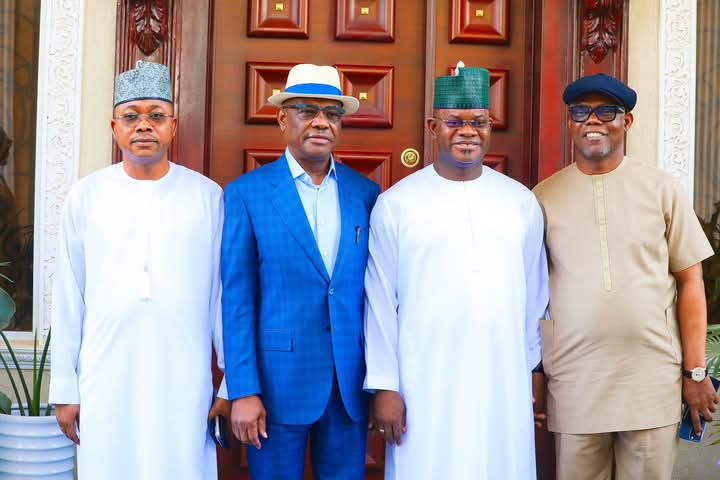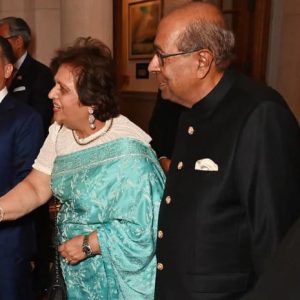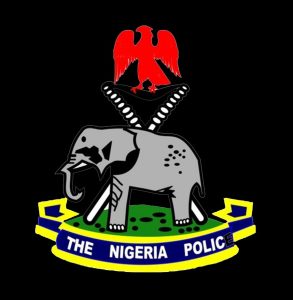Kogi Governor Ododo And Yahaya Bello, Once Declared Wanted By EFCC, Visit FCT Minister Wike Amid N190 Billion Fraud Cases
In an intriguing development amid ongoing corruption investigations, Kogi State Governor, Ahmed Usman Ododo, and his predecessor, Yahaya Bello, were seen visiting the Federal Capital Territory (FCT) Minister, Nyesom Wike, at his residence in Abuja on Thursday, January 23, 2025. The visit, which came amid allegations of multi-billion Naira fraud cases involving both men, has sparked significant public interest and raised eyebrows given their controversial pasts.
The meeting, which was revealed by Lere Olayinka, the Senior Special Assistant on Public Communication and Social Media to Minister Wike, was accompanied by several pictures shared on his X (formerly Twitter) handle. Olayinka’s post confirmed that both Bello and Ododo had paid a visit to the minister, who is also a former governor of Rivers State.
“Former Governor of Kogi State, Yahaya Bello, and his successor, Usman Ododo, visited the FCT Minister, Nyesom Wike, in his Abuja residence today,” Olayinka wrote, accompanied by images capturing the three figures in a seemingly friendly exchange.
The timing of this visit is noteworthy. Yahaya Bello, the former governor of Kogi, has been at the center of a major financial scandal involving allegations of gross mismanagement of public funds. As recently as November 2024, the Economic and Financial Crimes Commission (EFCC) filed fresh charges against Bello, accusing him of embezzling N110 billion from the Kogi State coffers. This came on the heels of an earlier investigation that saw the EFCC filing 19 charges against him and his associates, including his nephew, Ali Bello, and other Kogi State officials, for money laundering offenses amounting to over N80 billion.
The visit to Wike has raised several questions about the political dynamics at play, particularly given the ongoing legal battles faced by Bello, who was previously declared wanted by the EFCC over his role in the alleged fraudulent activities. This is not the first time Bello’s name has made headlines for all the wrong reasons. The EFCC‘s investigation into his administration’s financial dealings has led to one of the most high-profile anti-corruption cases in recent Nigerian political history.
In response to the charges, Yahaya Bello was arrested in November 2024 and detained in Abuja. Following his detention, he was granted bail by a Federal Capital Territory High Court in December 2024. The court set his bail at a staggering N500 million, with strict conditions requiring the former governor to provide three sureties in like sums. These sureties were required to be responsible citizens with landed properties in prime areas of the FCT, such as Guzape, Wuse 2, Apo, Asokoro, and Jabi. Furthermore, the sureties had to submit two passport-sized photographs and valid identification, including their National Identification Numbers (NINs).
Despite the grave nature of the charges against him, including accusations of using his political influence to manipulate financial resources for personal and political gain, Bello’s bail was granted on the premise of his rights to due process. However, the EFCC has made it clear that the former governor poses a significant risk to the integrity of the investigation, given his substantial political network and influence. The anti-graft agency has reportedly raised concerns about the potential for Bello to interfere with the ongoing probe or influence witnesses in the case.
Governor Ahmed Usman Ododo, who succeeded Bello as Kogi State governor, has also found himself embroiled in the ongoing scandal, though his involvement remains a point of contention. His presence at the meeting with Wike suggests that the political landscape in Kogi, and by extension Nigeria, is still heavily influenced by the web of power dynamics that exist between political allies, even in the face of serious criminal investigations.
The nature of the conversation between the three men remains unclear, but it has already sparked a wave of speculation regarding the political motivations behind the visit. Many political observers are questioning whether the visit is merely a social call or if it signifies deeper political maneuvering in the midst of the legal challenges facing both Bello and Ododo. Wike, known for his robust political presence, particularly in the southern region of Nigeria, has previously been an influential figure in national politics. His relationships with other governors and political figures, including those embroiled in corruption investigations, are often seen as part of his broader strategy to maintain relevance in Nigerian politics.
In the wake of the visit, many Nigerians are now demanding more transparency and accountability regarding the status of the corruption investigations involving Yahaya Bello and other key figures from his administration. Critics argue that the political elite, including both those in government and those in opposition, often use their influence to shield each other from the full weight of the law, leaving the general public to bear the brunt of systemic corruption.
The EFCC’s ongoing investigation into the Kogi State financial scandal is still in its early stages, but the implications of the case are already being felt across the country. With the specter of corruption hanging over many state governors, the visit by Bello and Ododo to Wike may only serve to deepen public skepticism regarding the political establishment’s commitment to addressing corruption.
Meanwhile, the controversy surrounding the case continues to capture the attention of Nigerians, many of whom are left wondering whether the judicial system will have the political will to fully investigate and prosecute those involved, regardless of their political affiliation. As the case unfolds, there will likely be more revelations that could further complicate the already murky waters of Nigerian politics.
In conclusion, the meeting between former Kogi Governor Yahaya Bello, his successor, Governor Ahmed Usman Ododo, and FCT Minister Nyesom Wike amid the ongoing N190 billion fraud case is a reminder of the political intricacies that continue to shape the country’s governance and legal systems. With the EFCC continuing its investigation into the alleged fraud, and with both men at the center of the controversy, the nation eagerly watches to see whether justice will prevail or if the powerful political networks will once again outmaneuver the rule of law.





